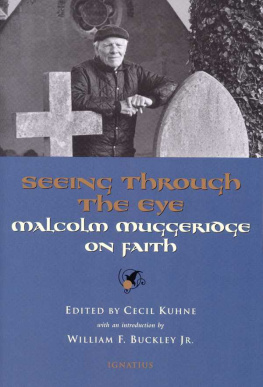Malcolm Muggeridge - Something Beautiful For God
Here you can read online Malcolm Muggeridge - Something Beautiful For God full text of the book (entire story) in english for free. Download pdf and epub, get meaning, cover and reviews about this ebook. year: 1972, publisher: Fontana Books, genre: Non-fiction. Description of the work, (preface) as well as reviews are available. Best literature library LitArk.com created for fans of good reading and offers a wide selection of genres:
Romance novel
Science fiction
Adventure
Detective
Science
History
Home and family
Prose
Art
Politics
Computer
Non-fiction
Religion
Business
Children
Humor
Choose a favorite category and find really read worthwhile books. Enjoy immersion in the world of imagination, feel the emotions of the characters or learn something new for yourself, make an fascinating discovery.
- Book:Something Beautiful For God
- Author:
- Publisher:Fontana Books
- Genre:
- Year:1972
- Rating:4 / 5
- Favourites:Add to favourites
- Your mark:
- 80
- 1
- 2
- 3
- 4
- 5
Something Beautiful For God: summary, description and annotation
We offer to read an annotation, description, summary or preface (depends on what the author of the book "Something Beautiful For God" wrote himself). If you haven't found the necessary information about the book — write in the comments, we will try to find it.
Something Beautiful For God — read online for free the complete book (whole text) full work
Below is the text of the book, divided by pages. System saving the place of the last page read, allows you to conveniently read the book "Something Beautiful For God" online for free, without having to search again every time where you left off. Put a bookmark, and you can go to the page where you finished reading at any time.
Font size:
Interval:
Bookmark:
First published by William Collins Sons & Co Ltd, London, 1971
First issued in Fontana Books, 1972
Copyright The Mother Teresa Committee, 1971
Made and printed in Great Britain by Jarrold & Sons Ltd, Norwich
All royalties from this book are paid to Mother Teresa Missionaries of Charity to whom donations may be sent c/o Barclays Bank Ltd, Station Approach, Southall, Middlesex, England.
The photographs are by S. K. Dutt from Camera Press London
I should explain, in the first place, that Mother Teresa has requested that nothing in the nature of a biography or biographical study of her should be attempted 'Christ's life', she wrote to me, 'was not written during his lifetime, yet he did the greatest work on earth - he redeemed the world and taught mankind to love his Father. The Work is his Work and to remain so, all of us are but his instruments, who do our little bit and pass by.' I respect her wishes in this, as in all other matters. What we are expressly concerned with here is the work she and her Missionaries of Charity - an order she founded - do together, and the life they live together, in the service of Christ, in Calcutta and elsewhere. Their special dedication is to the poorest of the poor; a wide field indeed.
Already they have houses in other Indian towns, in Australia and Latin America and Rome. There are also houses in Tanzania, Ceylon and Jordan. They are springing up all the time, almost of themselves, wherever the chain of affliction and destitution bites. In that Mother Teresa is the inspirer and mainspring of this work, the one to whom all the others turn, she has to be picked out for special attention. Pretty well everyone who has met her would agree, I think, that she is a unique person in the world today; not in our vulgar celebrity sense of having neon lighting about her head. Rather in the opposite sense - of someone who has merged herself in the common face of mankind, and identified herself with human suffering and privation.
It is, of course, true that the wholly dedicated like Mother Teresa do not have biographies. Biographically speaking, nothing happens to them. To live for, and in, others, as she and the Sisters of the Missionaries of Charity do, is to eliminate happenings, which are a factor of the ego and the will. 'Yet not I, but Christ liveth in me,' is one of her favourite sayings. I once put a few desultory questions to her about herself, her childhood, her parents, her home, when she first decided to become a nun. She responded with one of her characteristic smiles, at once quizzical and enchanting; a kind of half smile that she summons up whenever something specifically human is at issue, expressive of her own incorrigible humanity. Her home, she said, had been an exceptionally happy one. So, when her vocation came to her as a schoolgirl, the only impediment was precisely this loving, happy home which she did not wish to leave. Of course the vocation won, and for ever. She gave herself to Christ, and through him to her neighbour. This was the end of her biography and the beginning of her life; in abolishing herself she found herself, by virtue of that unique Christian transformation, manifested in the Crucifixion and the Resurrection, whereby we die in order to live.
There is much talk today about discovering an identity, as though it were something to be looked for, like a winning number in a lottery; then, once found, to be hoarded and treasured. Actually, on a sort of Keynesian principle, the more it is spent the richer it becomes. So, with Mother Teresa, in effacing herself, she becomes herself. I never met anyone more memorable. Just meeting her for a fleeting moment makes an ineffaceable impression. I have known people burst into tears when she goes, though it was only from a tea party where their acquaintance with her amounted to no more than receiving her smile. Once I had occasion to see her off, with one of the Sisters, at Calcutta railway station. It was the very early morning, and the streets were full of sleeping figures; sleeping with that strange, poignant abandon of India's homeless poor. We drove up to the station, absurdly enough, in a large American limousine which happened to be at my disposal. The porters rushed expectantly forward, and then fell back disappointed when I got out followed by two nuns wearing the white saris of their order, made of the cheapest possible cloth, and carrying for luggage only a basket of provisions, most of which, I well knew, would be distributed along the way. I saw them to the train, and settled them in a third-class compartment. Mother Teresa has a pass on the Indian railways given her by the Government. She has tried very hard to get a similar pass for air travel, and at one point offered to work as an air hostess on her air journeys in return for one; a prospect that I find delectable. Unfortunately, her offer was not accepted.
When the train began to move, and I walked away, I felt as though I were leaving behind me all the beauty and all the joy in the universe. Something of God's universal love has rubbed off on Mother Teresa, giving her homely features a noticeable luminosity; a shining quality. She has lived so closely with her Lord that the same enchantment clings about her that sent the crowds chasing after him in Jerusalem and Galilee, and made his mere presence seem a harbinger of healing. Outside, the streets were beginning to stir; sleepers awakening, stretching and yawning; some raking over the piles of garbage in search of something edible. It was a scene of desolation, yet it, too, seemed somehow irradiated. This love, this Christian love, which shines down on the misery we make, and into our dark hearts that make it; irradiating all, uniting all, making of all one stupendous harmony. Momentarily I understood; then, leaning back in my American limousine, was carried off to breakfast, to pick over my own particular garbage-heap.
I should add, perhaps, that the home Mother Teresa so loved was Albanian in Yugoslavia, and that she comes of peasant stock. This is apparent in her appearance and bearing and way of looking at things. Without the special grace vouchsafed her, she might have been a rather hard, and even grasping, person. God has turned these qualities to his own ends. I never met anyone less sentimental, less scatty, more down-to-earth. Thus, until she can accommodate her lepers in proper settlements where they can live useful, productive lives together, they still go out to beg in the streets of Calcutta if they want to. 'It's interesting for them,' she explained to me. If she happens to see them when they have come back, she will ask them how they have done. Not too well, it seemed, on the day I was with her. She commiserated with them on their poor takings. It was very beautiful to see her thus so eagerly, and with so lively an interest, discussing something so near to their hearts. Saints, I reflected, are far more like Mistress Quickly than Beatrice Webb or Eleanor Roosevelt - a thought that gave me great satisfaction.
It was while she was teaching at the Loreto convent school in Calcutta that the second great break in Mother Teresa's life took place; the call within a call, as she puts it. She had occasion to go into some of the very poorest streets of Calcutta - and where are there any poorer? - and suddenly realized that she belonged there, not in her Loreto convent with its pleasant garden, eager schoolgirls, congenial colleagues and rewarding work. Again the only impediment to her new vocation was the happiness and happy relationships it required her to relinquish. It might seem strange to regard any religious order as an unduly easeful existence, but that was how Mother Teresa saw it in contrast with the lives of the very poor in Calcutta. She had to wait for some two years to be released from the vows she had already taken in order to be able to go back into the world, there to take even stricter vows of her own devising. Ecclesiastical authority, I should add, is something that she accepts in the same unquestioning way that peasants accept the weather, or sailors storms at sea. It would never occur to her either to venerate or to challenge it. So she just waited patiently. When at last her release came, she stepped out with a few rupees in her pocket, made her way to the poorest, wretchedest quarter of the city, found a lodging there, gathered together a few abandoned children -there were plenty to choose from - and began her ministry of love.
Next pageFont size:
Interval:
Bookmark:
Similar books «Something Beautiful For God»
Look at similar books to Something Beautiful For God. We have selected literature similar in name and meaning in the hope of providing readers with more options to find new, interesting, not yet read works.
Discussion, reviews of the book Something Beautiful For God and just readers' own opinions. Leave your comments, write what you think about the work, its meaning or the main characters. Specify what exactly you liked and what you didn't like, and why you think so.












